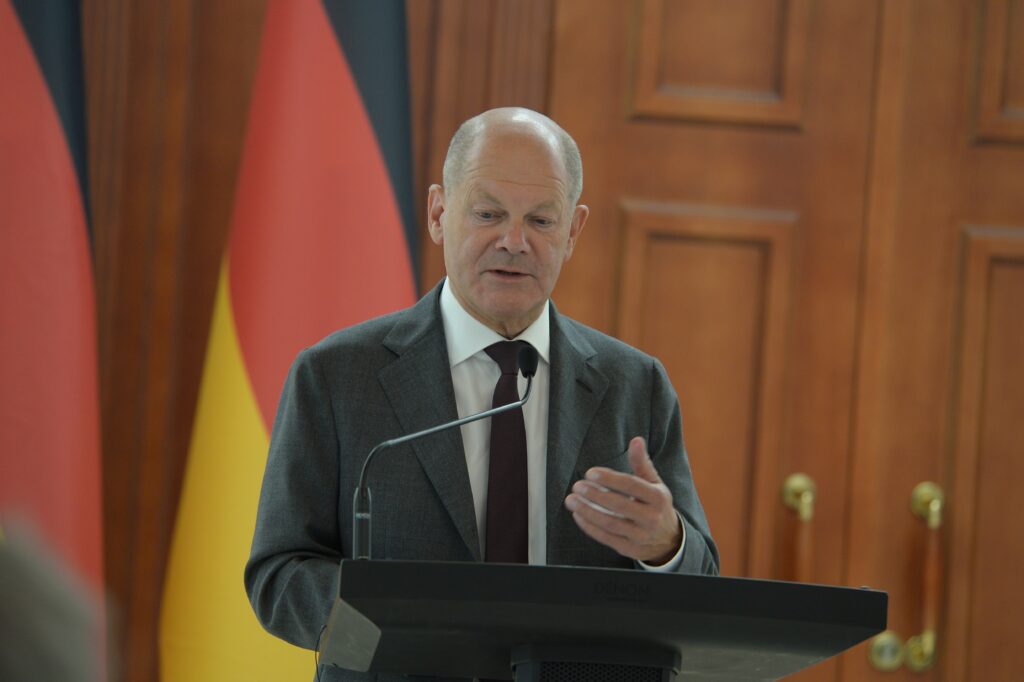Germany’s government has extended its border controls for another six months, aiming to address irregular migration. This move comes just weeks before the federal election on 23 February. Chancellor Olaf Scholz announced the extension on Wednesday, confirming that the European Commission has been formally notified. The new border measures will stay in effect until 15 September.
Scholz’s Position on Border Controls
Chancellor Olaf Scholz defended the extension, highlighting its effectiveness in reducing irregular migration. “With the border controls, we are successfully reducing irregular migration. The figures speak for themselves,” he said.
Since the controls were introduced in autumn 2024, German authorities have turned back 47,000 individuals. Asylum applications have dropped by one-third, and 1,900 people suspected of smuggling have been arrested. The initial border checks were implemented along Germany’s borders with Poland, the Czech Republic, Austria, and Switzerland. In September, the scope expanded to include France, Luxembourg, the Netherlands, Belgium, and Denmark.
The Role of the Schengen Zone
Germany’s decision raises questions about the future of the Schengen zone, which allows visa-free travel among most EU countries. Although the Schengen zone permits free movement, it also allows temporary border controls in times of serious security threats. Such measures must be limited in scope and duration. Germany’s move could influence how other EU countries manage border controls, especially if the migration crisis continues to intensify.
Migration Dominates Election Debates
Migration has become one of the most talked-about issues in the German election campaign. Opposition leader Friedrich Merz has proposed more stringent measures, including permanent border controls if he wins. Merz argues that Germany must block all illegal entries “without exception.” He believes national laws should take priority over what he calls “inefficient” EU policies.
His stance has gained significant attention, positioning migration as a key topic for voters. As the election nears, the debate over border controls and immigration policies will likely continue to shape public opinion.
Merz’s Hardline Proposal for Migration Control
Merz, who leads the Christian Democratic Union (CDU), has criticized the current government for not doing enough to tackle illegal immigration. “Germany cannot continue to accept the EU’s lax migration rules,” Merz argued. “We need stronger controls to secure our borders and protect national security.”
His proposal for permanent border checks has sparked division. Some supporters argue that such measures are necessary to protect Germany from illegal immigration and maintain control over who enters the country. Others warn that these policies could isolate Germany from its European neighbors and create further tension within the EU.
Government’s Defense of Current Policies
Scholz and his government have defended the temporary border controls, arguing that they are a necessary response to the ongoing migration challenges. The government has stressed that these measures help balance Germany’s humanitarian responsibilities with the need for security. The Green Party and the Free Democratic Party (FDP), both part of the ruling coalition, have also supported the government’s stance.
Despite political differences, all parties agree that migration is a pressing issue that needs careful management. However, the approach to solving the problem differs, with Scholz focusing on cooperation with the EU and Merz advocating for a more isolationist approach.
Implications for the European Union
The debate over border controls is not limited to Germany. Many EU countries are grappling with similar concerns, leading to calls for reform of the EU’s migration policies. Some countries are considering their own border checks, while others argue for greater solidarity among EU members to address the migration crisis.
The future of the Schengen zone remains uncertain. While many EU countries support open borders, others feel the pressure of rising migration and security concerns. The EU will have to balance the benefits of free movement with the need for stronger borders.
Migration and National Security
Germany’s decision to extend border controls and the broader debate over migration will shape the country’s future policies and its relationship with the EU. The issue of migration will continue to be a central theme in German politics, especially as the election approaches. As the situation develops, it will be crucial to monitor how the policies evolve and what impact they have on Germany and the wider Europe.
For more updates on this topic, visit Euro News 24.
